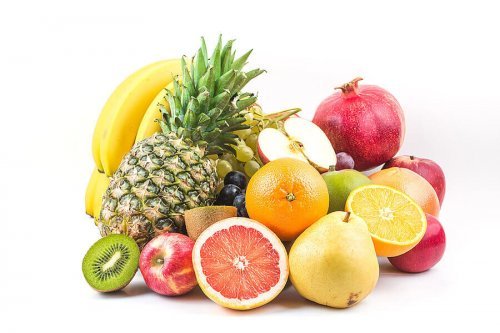Types of Carbohydrates: Does it Really Matter?

Usually, we classify foods according to the nutrient they have in greater proportion. However, you should know that these nutrients aren’t always the same and have several versions. This is true, regarding the different types of carbohydrates; it’s not enough to know the proportion they contain, we must also know the category they belong to.
When we think of this nutrient, the first thing that comes to mind is cereals. However, there are many more foods that contain them. In fact, you will be surprised more than once as we analyze the different types of carbohydrates. You’ll see how they’re not all equal.
Additionally, you’ll realize that it’s very important to know how to choose the right ones, depending on the time of day and the needs of each person.
Types of carbohydrates
Up next, we’ll describe the different types of carbohydrates and how each of them affects our body. We’ll also see what foods contain them.
Simple carbohydrates
First, let’s review simple carbohydrates, known for their rapid assimilation. They received this name because they’re formed by a chemical structure of one or two sugars.
Being so simple, the body doesn’t take long to break them down and assimilates them quickly. There are two types that stand out among simple carbohydrates:
Monosaccharides
Its chemical structure has only one sugar. That’s why they have a very sweet taste, as is the case with fruits, vegetables such as tomatoes, or dairy products. Glucose, fructose, and galactose belong to the group of monosaccharides.

Disaccharides
Its chemical structure is composed of two sugars. That’s why our body has to break them down into two individual sugars. In any case, it’s a very simple job, which our body does without making a great effort.
The most famous of all disaccharides are sucrose. It’s extracted from sugarcane and is widely used for its sweetening power. Lactose and maltose are disaccharides as well, which we can find in dairy products and seeds, respectively.
Complex carbohydrates
Complex or slow assimilation carbohydrates consist of monosaccharide chains. As we mentioned before, our body must break them down to the simplest form.
Enlight of that fact, this type of carbohydrate takes longer to assimilate. There are two types of complex carbohydrates.
The first one is starch, which is associated with foods of plant origin. Some foods that contain large amounts of this carbohydrate are potatoes, cereals, and legumes.
On the other hand, we have glycogen, which we can find in cereals, fruits, and legumes. The function it performs is very important, especially for athletes.
Glycogen acts as a reserve and is kept ready for those times when the body will need it. When we overexert ourselves, the body releases it and we gain additional energy.
What types of carbohydrates are better?
After reading this analysis about the different types of carbohydrates, you’re probably wondering which ones you should eat? There’s no reason to choose between them.
We can’t classify some carbohydrates as healthy and others as harmful. In reality, the most appropriate option is to combine the intake of both types to live a healthy life and obtain the necessary energy.

All you have to keep in mind is that you have to eat them moderately. It’s wrong to think that an excess of carbohydrates will contribute more energy. What actually happens in these cases is that the ones we don’t burn become fat. As a result, we gain weight.
In short, take the right amount depending on whether you need energy for several hours or for a while. Also, keep in mind that you have to consume the nutrients in the same proportion in which you’re going to burn them. Thus, people who perform high-intensity sports should not ingest the same amount as those who follow a sedentary lifestyle.
Usually, we classify foods according to the nutrient they have in greater proportion. However, you should know that these nutrients aren’t always the same and have several versions. This is true, regarding the different types of carbohydrates; it’s not enough to know the proportion they contain, we must also know the category they belong to.
When we think of this nutrient, the first thing that comes to mind is cereals. However, there are many more foods that contain them. In fact, you will be surprised more than once as we analyze the different types of carbohydrates. You’ll see how they’re not all equal.
Additionally, you’ll realize that it’s very important to know how to choose the right ones, depending on the time of day and the needs of each person.
Types of carbohydrates
Up next, we’ll describe the different types of carbohydrates and how each of them affects our body. We’ll also see what foods contain them.
Simple carbohydrates
First, let’s review simple carbohydrates, known for their rapid assimilation. They received this name because they’re formed by a chemical structure of one or two sugars.
Being so simple, the body doesn’t take long to break them down and assimilates them quickly. There are two types that stand out among simple carbohydrates:
Monosaccharides
Its chemical structure has only one sugar. That’s why they have a very sweet taste, as is the case with fruits, vegetables such as tomatoes, or dairy products. Glucose, fructose, and galactose belong to the group of monosaccharides.

Disaccharides
Its chemical structure is composed of two sugars. That’s why our body has to break them down into two individual sugars. In any case, it’s a very simple job, which our body does without making a great effort.
The most famous of all disaccharides are sucrose. It’s extracted from sugarcane and is widely used for its sweetening power. Lactose and maltose are disaccharides as well, which we can find in dairy products and seeds, respectively.
Complex carbohydrates
Complex or slow assimilation carbohydrates consist of monosaccharide chains. As we mentioned before, our body must break them down to the simplest form.
Enlight of that fact, this type of carbohydrate takes longer to assimilate. There are two types of complex carbohydrates.
The first one is starch, which is associated with foods of plant origin. Some foods that contain large amounts of this carbohydrate are potatoes, cereals, and legumes.
On the other hand, we have glycogen, which we can find in cereals, fruits, and legumes. The function it performs is very important, especially for athletes.
Glycogen acts as a reserve and is kept ready for those times when the body will need it. When we overexert ourselves, the body releases it and we gain additional energy.
What types of carbohydrates are better?
After reading this analysis about the different types of carbohydrates, you’re probably wondering which ones you should eat? There’s no reason to choose between them.
We can’t classify some carbohydrates as healthy and others as harmful. In reality, the most appropriate option is to combine the intake of both types to live a healthy life and obtain the necessary energy.

All you have to keep in mind is that you have to eat them moderately. It’s wrong to think that an excess of carbohydrates will contribute more energy. What actually happens in these cases is that the ones we don’t burn become fat. As a result, we gain weight.
In short, take the right amount depending on whether you need energy for several hours or for a while. Also, keep in mind that you have to consume the nutrients in the same proportion in which you’re going to burn them. Thus, people who perform high-intensity sports should not ingest the same amount as those who follow a sedentary lifestyle.
All cited sources were thoroughly reviewed by our team to ensure their quality, reliability, currency, and validity. The bibliography of this article was considered reliable and of academic or scientific accuracy.
- J Martaix, & F Sánches. (2008). Hidratos de carbono. Bioquímica.
- Young, C. C. (2008). Metabolismo de Los Hidratos de Carbono. American Journal of Public Health, 15(3), 250–250. https://doi.org/10.2105/ajph.15.3.250-a
This text is provided for informational purposes only and does not replace consultation with a professional. If in doubt, consult your specialist.








